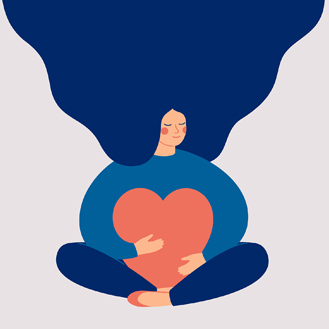
April 26, 2022
By Janet Kim, Drexel University College of Medicine
We have all heard the hashtags (#TreatYourself) and ad campaigns to promote self-love, and its benefits on our emotional and mental well-being. However, the effects of stress on mental well-being have never been more pertinent. With the rising stresses of the COVID pandemic, researchers have found that women have been especially susceptible to the mental health consequences. Studies show women are almost three times as likely as men to report suffering from significant mental health consequences, including anxiety, loss of appetite, insomnia and trouble completing everyday tasks1. The practices of mindfulness and self-compassion have often been employed by counselors and practitioners as a method to manage stress. These methods have been found to improve psychological health and increase resiliency2; and a recent study has also linked self-compassion with reduced risk of developing future cardiovascular disease.
Thurston et al. asked 200 middle-aged women to fill out a questionnaire regarding feelings of self-compassion2. Self-compassion is defined as a “positive psychological construct characterized by extending compassion toward oneself, often during periods of suffering.” Women with higher self-compassion ratings were found to have a lower mean carotid-intima-media thickness, meaning the wall of a large blood vessel feeding the head was thinner due to less plaque build-up. Lower mean carotid-intima-media thickness is associated with a lower risk of cardiovascular disease in the future. This association remained after the findings were adjusted for demographics, other cardiovascular disease risk factors, and depression. Therefore, practicing self-love and self-compassion during times of high stress can be associated with a lower risk of long-term cardiovascular disease.
Some ways we can practice self-compassion are3:
- Self-kindness – Considering our own needs and treating ourselves with kindness. This includes taking rest when you need it, asking for help or doing something fun.
- Mindfulness – Being aware of the physical, emotion or mental pain in the moment.
- Common Humanity – Recognizing that these experiences are a normal part of being.
We are living through some undoubtedly stressful times. Practicing kindness and compassion toward ourselves has been shown to improve both and physical and mental health. A large barrier to self-compassion is our belief that it is narcissistic or selfish. However, self-compassion has been found to help individuals remain emotionally stable to sustain caring for others. Though this is easier said than done, we owe it to ourselves to show the same kindness to ourselves that we show to others. We are all doing our best, and we are in it together.
Sources/Resources: